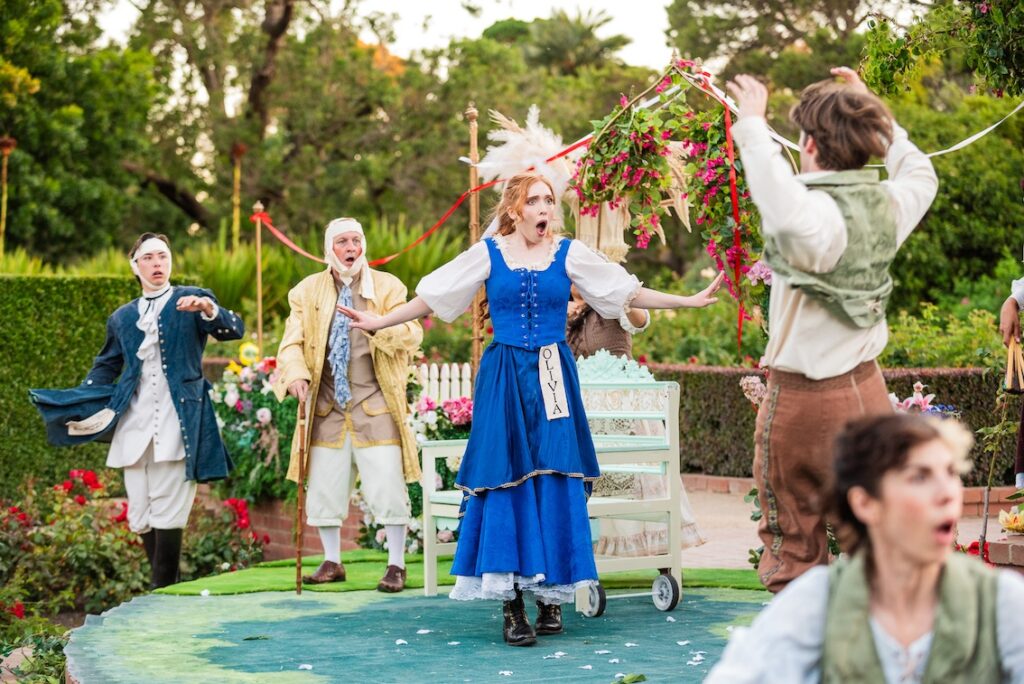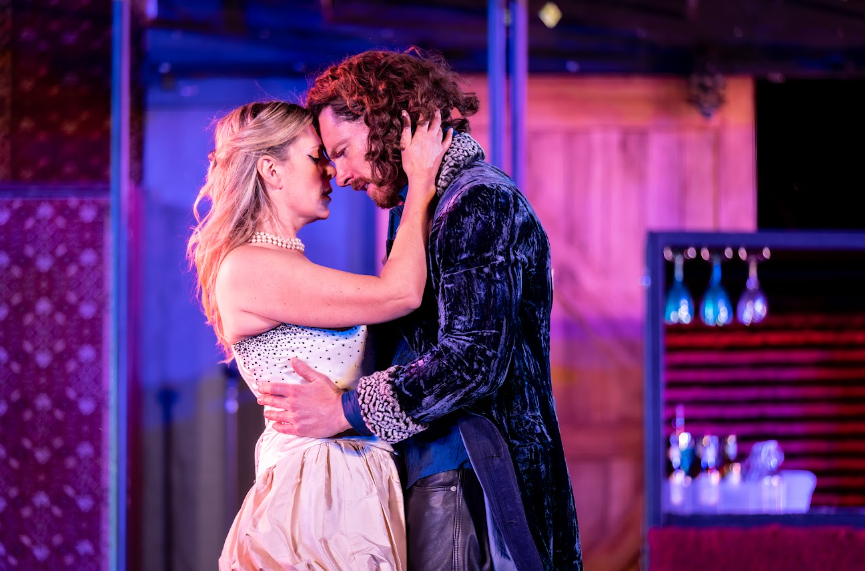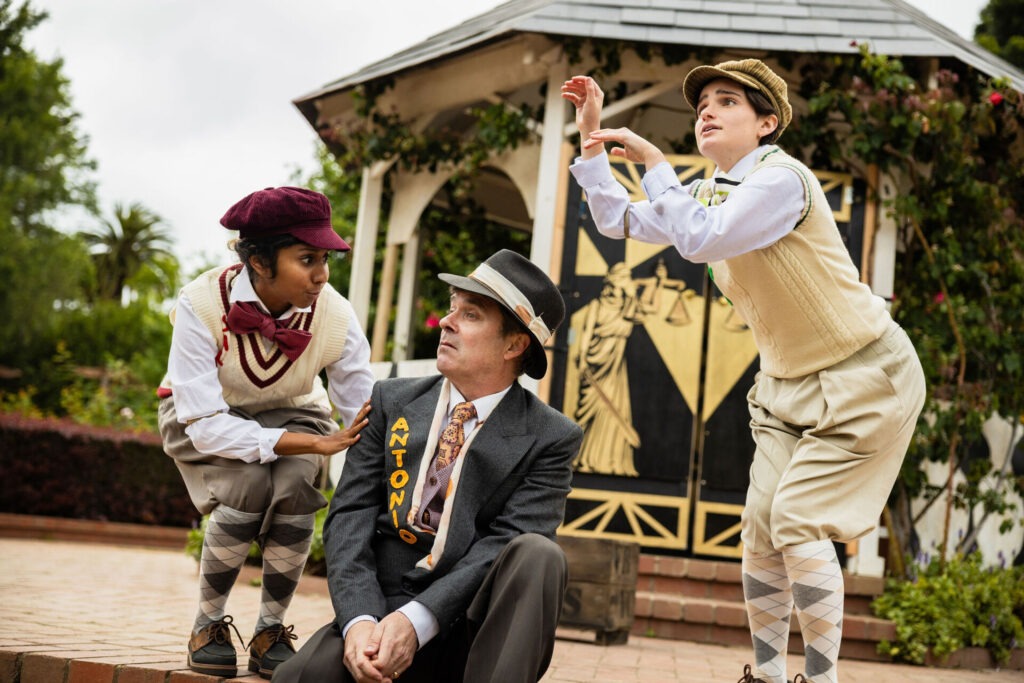
‘Twelfth Night’ // Melbourne Shakespeare Company
‘Twelfth Night’ was great.
Much like the Myer Windows, the Boxing Day Test, or the Australian Open, it is hard to picture summertime in Melbourne without thinking about Shakespeare. Every December, Melbourne’s parklands host a myriad of the Bard’s productions at twilight. This season is no different, with the first production well underway. Set within the picturesque rose garden of the St Kilda Botanical Gardens, Melbourne Shakespeare Company’s rendition of ‘Twelfth Night’ is the perfect show to ring in the first few warm nights of summer with.
Although ‘Twelfth Night’ marks the first show of the summer season for the Melbourne Shakespeare Company (MSC), it by no means is its first of the year. The Company staged successful productions of Shakespeare’s ‘Much Ado About Nothing’ in March and ‘Hamlet’ in September, in addition to the Samuel D. Hunter-penned play ‘The Whale’ during its winter season. Now, the MSC is returning to Shakespearean comedy with ‘Twelfth Night’, offering audiences ample doses of unrequited love, mistaken identity, cheeky euphemisms, and musical interludes.
As the title might suggest, it is believed that Shakespeare penned the eponymous play during 1601-02 as celebratory entertainment for the Twelfth Night of the Christmas season. In similar fashion as many of his other renowned comedies, ‘Twelfth Night’ is a tale of love and misinformation. The play tells the story of Viola, one half of a set of twins, who upon surviving a shipwreck on the shore of Illyria (or ‘Straylia’ as MSC renamed it), believes her brother Sebastian has perished. Disguising herself as a man named ‘Cesario’, Viola comes to serve (and fall in love with) the distinguished Duke Orsino. Orsino is in love with Countess Olivia, who in turn falls in love with ‘Cesario’ when ‘he’ comes to deliver her a message from the Duke. Numerous moments of folly and mischief ensue, culminating in a play that is recognised as one of the Bard’s most beloved.
‘Twelfth Night’ has been adapted countless times for the stage, screen, and radio. Historians and scholars attest that the original play was likely commissioned for the Twelfth Night celebrations held at Whitehall Palace on 6 January 1601 by Queen Elizabeth I. Moving into the 20th century, Harley Granville-Barker staged productions at London’s Old Vic Theatre in 1912 and 1916. The 1960s saw Dames Diana Rigg and Judi Dench each play the role of Viola in the 1966 and 1969 Royal Shakespeare Company’s productions, respectively. Its most recent staging of note was in 2017 when the Royal National Theatre chose to swap several characters’ genders and sexualities. The play also inspired several musical re-workings, including the Duke Ellington and Elvis Presley jukebox musicals, ‘Play On!’ and ‘All Shook Up’. The late 1990s saw the play immortalised on the silver screen twice. First, in Trevor Nunn’s 1996 direct adaptation starring Sir Ben Kingsley and Helena Bonham Carter; and then, tangentially, through the Academy Award-winning ‘Shakespeare in Love’ two years later. Millennial theatre fans will likely be most familiar with the 2006 teen romantic comedy ‘She’s the Man’, starring Amanda Bynes as Viola and Channing Tatum as Duke Orsino (in his breakthrough role).
Returning to the MSC’s summer production, ‘Twelfth Night’ is a romantic, musical romp among the aromatic flora of the St Kilda Botanical Gardens. No stranger to this venue, the MSC again calls the Rose Garden home for ‘Twelfth Night’. The iconic cottage-esque rotunda is draped in a cascade of rainbow flowers at every opening. Two pale blue benches sit on either side of the rotunda’s front, evoking a beautifully symmetrical aesthetic. Two arches, similarly adorned in multi-coloured florals, stand stationary on each side of the scene. Anyone would be forgiven for thinking the set-up was orchestrated for a twilight wedding. That of course is the point. Immediately imbuing the scene with a romantic feel, Ishan Vivekanantham and Violeta Capella Tubella’s set design hit the mark.
As the actors casually enter the garden to playfully interact with audience members before the show begins, it is easy to be drawn to their garments. Created by three-time MSC collaborator Cortnee Jarvis, the costumes are elegant, yet practical. Patterned fabric adorns many of the performers. Clearly inspired by the regency romance of Jane Austen and Georgette Heyer, one would have thought Jarvis had dropped into Madame Delacroix’s Modiste shop. Dressed in gowns, pantaloons, and suit vests, the costuming clearly aims to pair the majesty of upper-class romance with the pragmatism of physical theatre. The names of each character are attached to the performer’s belts, a customary tradition the MSC upholds when performing their namesake plays. It can be difficult to find the right balance between aesthetics and functionality, yet Jarvis continues to demonstrate her ability to do so with ease.
While the bulk of the play’s action takes place within the confines of the rotunda’s staging, the Rose Garden’s expanse is navigated freely by performers throughout the show. Several instances occur whereby performers are seen ‘promenading’ along the rose hedges in the distance, oblivious to the action taking place in the stage’s foreground. These interludes do not necessarily contribute anything to the plot; however, their inclusion is a nice reminder of the world-building Shakespeare constructs within his plays. In this sense, the stage management and choreography team of Seamus Allen, Madison McHenry, and Callum Marshall remind audiences that everyone is doing ‘something’ at any given time of day, no matter the time or place. The most humorous of these background interactions see Emma Austen and Maxwell Simon (dressed as their secondary roles of nuns) picking and placing flowers into a woven basket for their assumed convent.
With many allusions to historical romance, MSC’s ‘Twelfth Night’ does include one contemporary ingredient in its production – music. Each of the performers proves themselves to be a triple threat, with them all showing off their ability to act, dance, and sing throughout. In terms of the latter, music is injected into the performance as a way of expressing characters’ emotions and bringing the text into the modern zeitgeist. Akin to any good jukebox musical, the directorial team of Jennifer Sarah Dean (Director), Michael Mack (Producer), Bridget Sweeney (Assistant Director), and David Youings (Musical Director) infuse the production with notable earworms from the past several decades. From Calvin Lewis’ “When a Man Loves a Woman” to the Backstreet Boys’ “Show Me the Meaning of Being Lonely”, “Uptown Funk” to “Tubthumping”, each song seems perfectly chosen to convey the moment at hand. With the exception of a drum, acoustic guitar and shaker, all songs are performed a cappella. Dean, Mack, Sweeney, and Youings pay homage to the musical theatre troupe of characters singing their feelings in a delightfully earnest way. Not all songs hit the mark to the same degree as others, with some feeling a little more like time-fillers than performances. For the most part, though, the musical interludes are a welcome addition.
MSC’s ‘Twelfth Night’ boasts a high calibre of performing talent. A thirteen-strong cast makes up the performance, with audiences likely to be hard-pressed to single out any weak links.
Lucy May Knight’s Officer Curio makes good use of the brief time they are on stage. Their talent for physical comedy exemplifies why they are a mainstay among the MSC cast. The combined comedic timing of Joshua Gordon (Feste), Emma Austin (Captain Valentine), Karlis Zaid (Sir Toby), Jacqueline Whiting (Antonio), Laura Iris Hill (Malvolio), and Teresa Giansiracusa (Fabian) demonstrate the magic that can happen when a cast has genuine chemistry onstage.
While Maxwell Simon’s Orsino does feel slightly underutilised (through no fault of the production; simply how the play was written); he nevertheless delivers laughs through his charmingly clueless portrayal of the lovelorn Duke. Billy Thomas’ turn as the presumed lost Sebastian is brief, yet charmingly delivered. Claire Warrillow beautifully feisty portrayal of Countess Olivia is a crowd-pleaser, shining particularly bright when she sings.
Stephanie Astrid John, Sebastian Li, and Sonya Suares are definitive standouts though. Li’s portrayal of the lovable-yet-ultimately-friendzoned Sir Andrew gets many of the show’s biggest laughs. Li’s ability to interact with his fellow actors and the audience in unison is the mark of a true performer. Suares’ Maria is delightfully devious. Audiences relish her ability to make the oft-scheming lady’s maid a charming, likeable character. Stephanie Astrid John’s central performance of Viola-cum-Cesario is a highlight from start to finish. John displays a true affection for the source material through her performance. Her ability to transition from the demure Viola to the confident Cesario is consistently impressive.
As the days grow longer and warmer, the Melbourne Shakespeare Company’s summer season is heating up in more ways than one. Renowned as one of the Bard’s most romantic comedies, ‘Twelfth Night’ is a celebration of love, music, and wish fulfilment galore. Set among the picturesque roses of St Kilda’s Botanical Gardens, MSC ‘Twelfth Night’ is the perfect show to accompany a twilight picnic with friends. The famous line from the play goes, “some are born great, some achieve greatness, and some have greatness thrust upon them”. In coming to see ‘Twelfth Night’, you can be sure of the latter.
‘Twelfth Night’ performs until Saturday, 22 December 2024 at the St Kilda Botanical Gardens. For more information or to purchase tickets, visit the Melbourne Shakespeare Company’s website.






